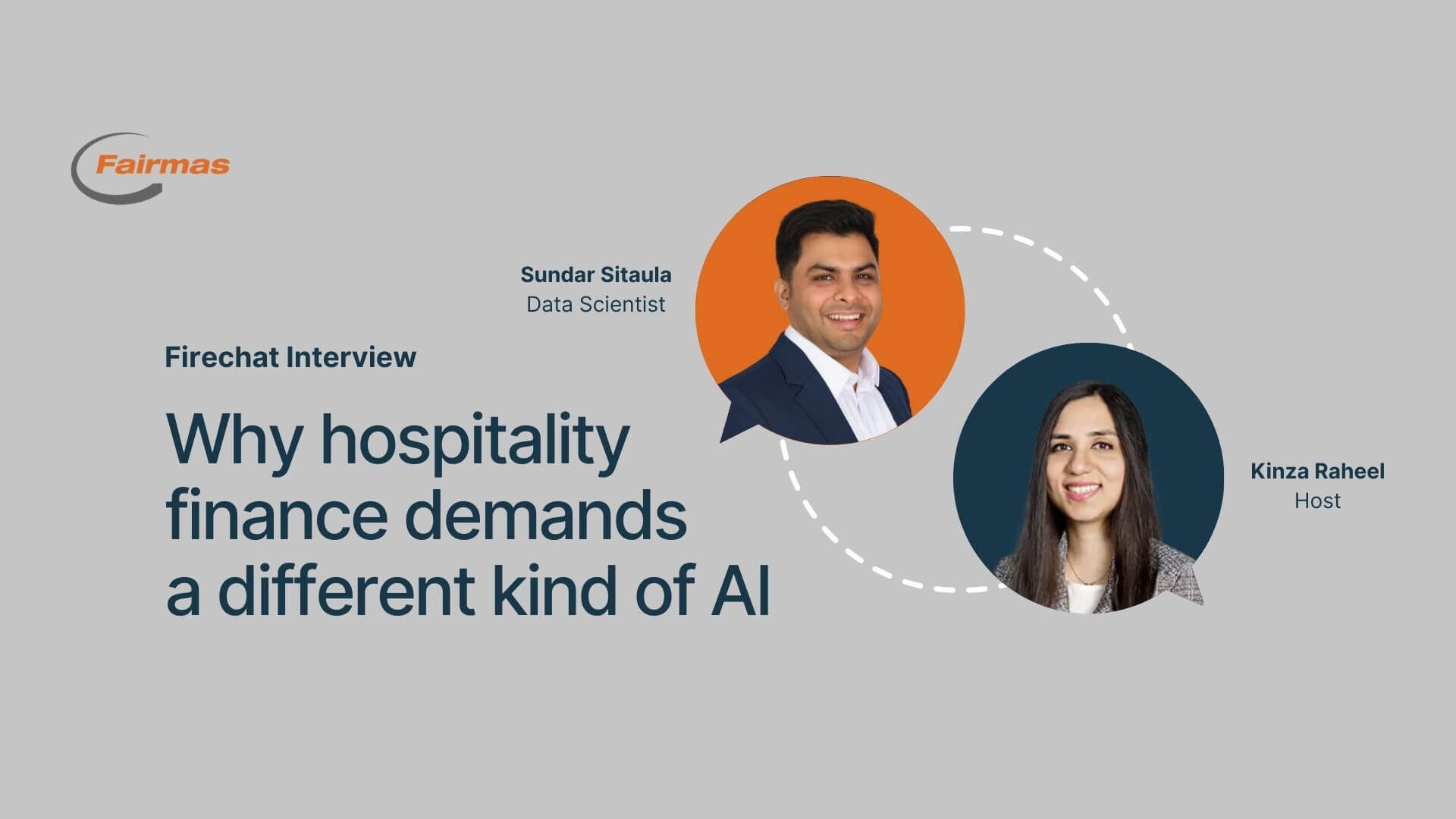

Introduction
The hospitality industry has traditionally been cautious
about adopting new technologies, but change is no longer optional. As
artificial intelligence (AI) gains momentum, it's no longer just a
buzzword—it’s a practical next step with the potential to transform how hotels
plan, analyze, and optimize their finances.
At Fairmas, we’re not focused on flashy features. We
believe AI must be secure, purposeful, and designed to solve real business
challenges—especially in a data-sensitive and highly complex field like
hospitality finance.
To explore this further, our International Marketing and
Communications Manager, Kinza Raheel, sat down with Sundar Sitaula, our Data
Scientist at Fairmas, for an open conversation about the real role of AI in
financial planning. From revenue optimization to access security, Sundar shares
an honest and insightful view of how AI is evolving within our industry and at
Fairmas.
Read the interview below for more insights:
Kinza:
Sundar, welcome! Let’s get right into it. The hospitality industry often seems
hesitant to embrace new technologies. Why do you think AI still feels
“futuristic” to so many in this space?
Sundar:
Thanks, Kinza! Great to be here. Yes, AI still feels futuristic because most
people associate it with consumer experiences, like voice assistants or travel
apps. But when we talk about AI in hospitality financial planning and analysis,
we’re dealing with a whole other level of complexity. It’s not about
novelty—it’s about precision, security, and real business outcomes.
Kinza:
So let’s talk application. Where exactly is AI making an impact in hospitality
finance?
Sundar:
There’s a lot of value across key areas:
- Dynamic
pricing and revenue management – AI fine-tunes rates
based on real-time demand.
- Forecasting
and budgeting – It identifies patterns that humans
might miss.
- Operational
efficiency and cost optimization – Smarter allocation,
lower waste.
- Energy
management – AI helps reduce utility costs.
- Automated
reporting – Time-saving and consistent.
- Anomaly
and fraud detection – Especially important for
maintaining financial integrity.
Kinza:
That’s
powerful. But I imagine with great data comes great responsibility. Let’s talk
about access security.
Sundar:
Exactly.
And this is where things get serious. Most general AI models are not built with
deep access control in mind. Anyone can ask anything—and that just doesn’t work
for us.
In hospitality finance:
- Not
everyone should be allowed to access everything.
- Nobody
from outside the organization should have entry.
- Internally,
access must be very granular and specific, based on user roles.
- And
100% accuracy is essential—financial data leaves no room for approximation
or “close enough.”
This makes our use case far more complex than consumer
tools. We’re not asking AI for a holiday recommendation. We’re asking it to
support critical business decisions that can impact millions in profit.
Kinza:
So
AI in this context is not just another fancy tool. It has to be secure and
purposeful.
Sundar:
Absolutely.
Even from a sales and marketing point of view, it’s sometimes tempting to offer
a quick and simple “wow” effect. But it’s not in our nature to resort to sudden
or superficial gimmicks. Our goal is to provide relevant solutions that deliver
real value, while upholding our standards of data protection and
confidentiality.
Kinza:
That’s
a great philosophy. On a more personal note, based on your experience, how does
this compare to other B2B AI use cases?
Sundar:
It’s
significantly more demanding. Compared to other B2B AI use cases, hospitality
finance involves a unique level of complexity and unpredictability. Unlike
industries such as manufacturing, where conditions are relatively stable,
hotels operate in an environment that can change hourly. Factors like weather,
local events, traffic, and even last-minute group bookings can dramatically
impact performance and planning.
What makes it even more challenging is that no two hotels
are exactly the same. A hotel near a major attraction will have very different
dynamics than one in a quiet business district. These differences mean that
financial planning must be highly customized and constantly adjusted based on
real-time inputs.
That’s why at Fairmas, we focus on building AI that’s not
just powerful but also deeply tailored, responsible, and secure—because in
hospitality finance, there is no one-size-fits-all approach.
Kinza:
Well
said. Thank you, Sundar, for sharing these real-world insights. It’s clear that
AI in hospitality finance is not about hype—it’s about building meaningful,
secure, and practical solutions that truly make a difference.
Conclusion
AI is not a magic solution, and it shouldn’t be treated
as one. As Sundar highlighted, it’s a tool that supports human decision-making.
The strength of AI in hospitality finance lies in its ability to process vast
amounts of data, identify trends, and enhance accuracy and efficiency—all while
keeping data protection front and center.
At Fairmas, we don’t chase hype. We’re focused on
delivering solutions that provide real value to our customers. Every AI feature
we develop must meet the highest standards of data security, accuracy, and
business relevance. The financial planning needs of the hospitality industry
are complex—but with the right application of AI, they can be handled more
intelligently, more securely, and more effectively.
Fairmas software solutions, further integrated with AI,
are here to drive smarter decision-making—and ultimately, boost profitability.







